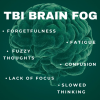Cannabidiol and Brain Injuries
Cannabidiol (CBD) is one of the chemicals (of the chemical class called cannabinoids), that is found in cannabis sativa plants such as marijuana and hemp. The two main chemicals (also known as extracts) in the marijuana plant are CBD and Tetrahydrocannabinol (THC), while hemp mostly consists of CBD. Administering CBD will not get you “high” and should not be confused with the commonly known cannabinoid THC, which produces psychoactive effects such as euphoria, resulting in feeling “high.” Over the years CBD has become a popular topic and […]
Cannabidiol and Brain Injuries Read More »












